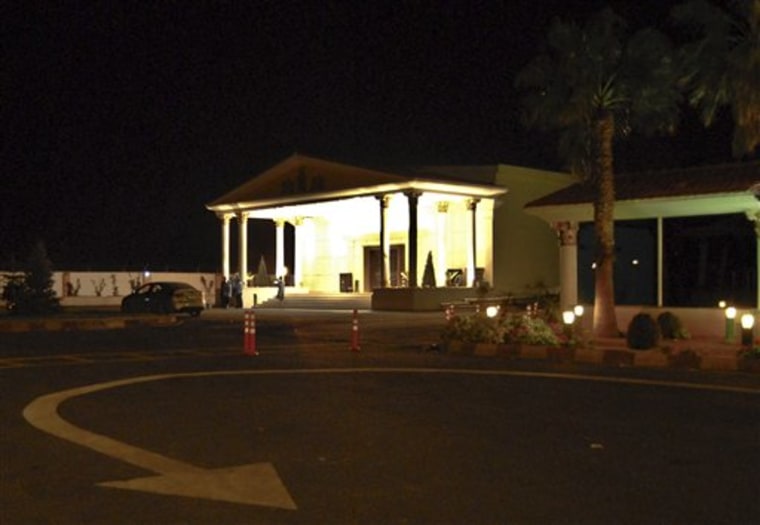The young roulette dealer, dressed in electric green, gives the wheel a spin as a crowd of men clutch their whiskey glasses, hoping to strike it rich.
Thus begins a night of gambling, drinking and mingling at the newly opened Casino Damascus — the first to open in Syria in nearly four decades.
The glittering casino showcases Syria's gradual shedding of its socialist past in favor of the free market. At a time when economic discontent is shaking Tunisia and Egypt, President Bashar Assad is gambling that gradual change can insulate his country from such tumult.
But for this country's secular regime, Casino Damascus may be too much for devout Muslims to swallow.
"Gambling is a grave sin," said Mohammed Habash, member of parliament and director of the Islamic Studies Center, who puts it on a par with drug abuse. "We must use all legal means to prevent gambling from entering our lives."
The casino is hardly as glamorous as those in neighboring Lebanon or Turkey, but officials hope it will help shed Syria's image as a rigid, closed country and attract tourists from oil-rich Arab countries.
"Syria has opened up, and this is one of the signs," said Jihad Yazigi, editor-in-chief of The Syria Report, a Paris-based online weekly founded the year after Assad succeeded his father, Hafez Assad, as president.
Casinos are rare in Arab countries; many use Islamic law, which forbids gambling. On a recent night, however, the smoke-filled Casino Damascus was operating at full capacity. Coins jingled in slot machines, and smartly dressed men and women placed bets at baccarat, blackjack and roulette tables.
"It's a good economic move, but a bad one for society," said Marwan, a 70-year-old Syrian. "I see a lot of young people getting into trouble. This is not a good hobby," he said.
Still, it didn't stop this twice-weekly customer from taking his seat at the blackjack table, although he and other gamblers declined to be fully identified, reflecting the stigma that still surrounds gambling in Syria.
That stigma apparently explains why the casino is near the airport, some 30 kilometers (20 miles) from downtown, and was inaugurated without fanfare on Christmas Eve.
There are no signs advertising its existence, and it is one of the few public places that does not feature a portrait of Assad — a sign the president does not want to be associated with it publicly, even though the casino could not have without his approval.
The owner is Syrian businessman Khaled Hboubati, whose father owned a casino in the same place before it was closed down in the mid-1970s during Hafez Assad's three decades of iron-fisted rule.
His son, a British-trained eye doctor, has moved slowly to lift Soviet-style economic restrictions. He has let in foreign banks, thrown the doors open to imports, authorized private universities and empowered the private sector.
"It shows a desire on the part of the Syrian government to portray a more liberal Syria in terms of societal behaviors," said editor Yazigi.
Today's Syria is buzzing with young people enjoying the country's many sidewalk cafes, pubs and nightclubs. Glossy shopping malls vie with the famous bazaar, and dozens of historic houses have been converted into boutique hotels and fine restaurants.
The Damascus Opera House, inaugurated by Assad and his wife, Asma, in 2004, features international orchestras, plays and exhibitions.
Tourism Minister Saadalla Agha Al Kalaa says tourism last year rose 40 percent from 2009, generating $8 billion in revenues, and this month a U.S. ambassador arrived to take up his post, the first since 2005.
It all points to a country breaking out of the isolation it has suffered over accusations of involvement in the assassination of a former prime minister in neighboring Lebanon, of working against the U.S. presence in neighboring Iraq and of supporting Palestinian militants.
Syria has fought three wars with Israel, while its troops stationed in Lebanon controlled that country for 29 years. Market reforms and hopes of foreign investment are a strong incentive to prevent any renewal of tensions.
Assad has not matched liberal economics with political reforms, and opponents who publicly criticize the regime are jailed.
Still, that legislator Habash can denounce the casino openly as sinful, and be joined by other lawmakers, suggests something may be loosening up on the political front. The parliament, a rubber-stamp body in times past, is scheduled to discuss the casino in special session on Feb. 15.
The economic liberalization itself has critics who say it is pushing up prices and widening the gap between rich and poor in the nation of 23 million people.
Unemployment is estimated to have reached 11 percent last year.
"There is a dangerous economic disparity between Syrians, and such projects as the casino help emphasize that gap," said Nabil al-Samman, a Syrian economist.
"The transformation from a near-socialist system to a capitalist one was rushed and unstudied. The people with money took advantage of this opportunity to get even richer while the poor have gotten poorer," he said.
Yazigi says it's not the pace of liberalization that has worked against it, but corruption and an inefficient legal system that, despite improvements, still tend to scare off foreign investment.
The lawyer for Ocean Club, the company operating Casino Damascus, says the casino aims to lure back Syrian money spent at casinos abroad.
"This way you are at least saving Syrian funds from being squandered outside the country," he told The Associated Press.
He spoke on condition of anonymity, citing a decision by the club owners to avoid publicity. Owner Hboubati declined interview requests.
